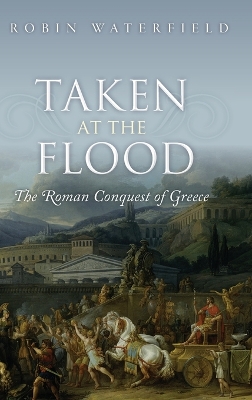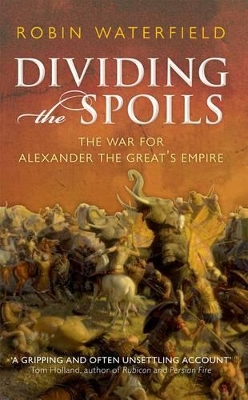Ancient Warfare and Civilization
2 total works
The Romans first set military foot on Greek soil in 229 BCE; only sixty or so years later it was all over, and shortly thereafter Greece became one of the first provinces of the emerging Roman Empire. It was an incredible journey - a swift, brutal, and determined conquest of the land to whose art, philosophy, and culture the Romans owed so much.
Rome found the eastern Mediterranean divided, in an unstable balance of power, between three great kingdoms - the three Hellenistic kingdoms that had survived and flourished after the wars of Alexander the Great's Successors: Macedon, Egypt, and Syria. Internal troubles took Egypt more or less out of the picture, but the other two were reduced by Rome. Having established itself, by its defeat of Carthage, as the sole superpower in the western Mediterranean, Rome then systematically went about
doing the same in the east, until the entire Mediterranean was under her control.
Apart from the thrilling military action, the story of the Roman conquest of Greece is central to the story of Rome itself and the empire it created. As Robin Waterfield shows, the Romans developed a highly sophisticated method of dominance by remote control over the Greeks of the eastern Mediterranean - the cheap option of using authority and diplomacy to keep order rather than standing armies. And it is a story that raises a number of fascinating questions about Rome, her empire, and her
civilization. For instance, to what extent was the Roman conquest a planned and deliberate policy? What was it about Roman culture that gave it such a will for conquest? And what was the effect on Roman intellectual and artistic culture, on their very identity, of their entanglement with an older Greek
civilization, which the Romans themselves recognized as supreme?
Rome found the eastern Mediterranean divided, in an unstable balance of power, between three great kingdoms - the three Hellenistic kingdoms that had survived and flourished after the wars of Alexander the Great's Successors: Macedon, Egypt, and Syria. Internal troubles took Egypt more or less out of the picture, but the other two were reduced by Rome. Having established itself, by its defeat of Carthage, as the sole superpower in the western Mediterranean, Rome then systematically went about
doing the same in the east, until the entire Mediterranean was under her control.
Apart from the thrilling military action, the story of the Roman conquest of Greece is central to the story of Rome itself and the empire it created. As Robin Waterfield shows, the Romans developed a highly sophisticated method of dominance by remote control over the Greeks of the eastern Mediterranean - the cheap option of using authority and diplomacy to keep order rather than standing armies. And it is a story that raises a number of fascinating questions about Rome, her empire, and her
civilization. For instance, to what extent was the Roman conquest a planned and deliberate policy? What was it about Roman culture that gave it such a will for conquest? And what was the effect on Roman intellectual and artistic culture, on their very identity, of their entanglement with an older Greek
civilization, which the Romans themselves recognized as supreme?
This is the story of one of the great forgotten wars of history - which led to the division of one of the biggest empires the world has ever seen.
Alexander the Great built up his huge empire in little more than a decade, stretching from Greece in the West, via Egypt, Syria, Babylonia, and Persia through to the Indian sub-continent in the East. After his death in 323 BC, it took forty years of world-changing warfare for his heirs to finish carving up these vast conquests. These years were filled with high adventure, intrigue, passion, assassinations, dynastic marriages, treachery, shifting alliances, and mass slaughter on battlefield
after battlefield. And while the men fought on the field, the women schemed from their palaces and pavilions.
Dividing the Spoils revives the memory of Alexander's Successors, whose fame has been dimmed only because they stand in his enormous shadow. In fact, Alexander left things in a mess at the time of his death, with no guaranteed succession, no administration in place suitable for such an enormous realm, and huge untamed areas both bordering and within his 'empire'. The Successors consolidated the Conqueror's gains. Their competing ambitions, however, meant that consolidation inevitably
led to the break-up of the empire.
Astonishingly, this period of brutal, cynical warfare was also characterized by brilliant cultural developments, especially in the fields of philosophy, literature, and art. As well as an account of the military action, this is also the story of an amazing cultural flowering. In some senses, a new world emerged from the dust and haze of battle - the world of Hellenistic Greece.
A surprising amount of the history of many countries, from Greece to Afghanistan, began in the hearts and minds of the Successors of Alexander the Great. As this book demonstrates, their stories deserve to be better known.
Alexander the Great built up his huge empire in little more than a decade, stretching from Greece in the West, via Egypt, Syria, Babylonia, and Persia through to the Indian sub-continent in the East. After his death in 323 BC, it took forty years of world-changing warfare for his heirs to finish carving up these vast conquests. These years were filled with high adventure, intrigue, passion, assassinations, dynastic marriages, treachery, shifting alliances, and mass slaughter on battlefield
after battlefield. And while the men fought on the field, the women schemed from their palaces and pavilions.
Dividing the Spoils revives the memory of Alexander's Successors, whose fame has been dimmed only because they stand in his enormous shadow. In fact, Alexander left things in a mess at the time of his death, with no guaranteed succession, no administration in place suitable for such an enormous realm, and huge untamed areas both bordering and within his 'empire'. The Successors consolidated the Conqueror's gains. Their competing ambitions, however, meant that consolidation inevitably
led to the break-up of the empire.
Astonishingly, this period of brutal, cynical warfare was also characterized by brilliant cultural developments, especially in the fields of philosophy, literature, and art. As well as an account of the military action, this is also the story of an amazing cultural flowering. In some senses, a new world emerged from the dust and haze of battle - the world of Hellenistic Greece.
A surprising amount of the history of many countries, from Greece to Afghanistan, began in the hearts and minds of the Successors of Alexander the Great. As this book demonstrates, their stories deserve to be better known.

